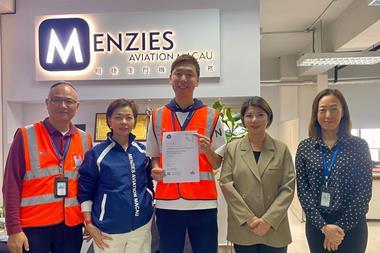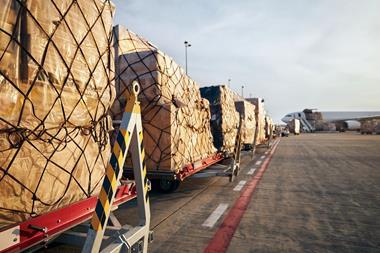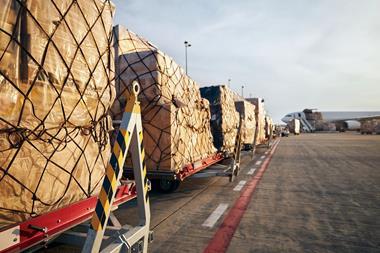If you need one word to sum up the mood music of the first day of IATA’s World Cargo Symposium in Abu Dhabi, then that word is optimism, albeit with a few caveats circling overhead.
The contrasting key factors discussed during the launch day’s plenary session included: trade protectionism, a growing middle class, signs of a muted air cargo uptick e-commerce, data, e-AWBs and disruptors.
A panel of four industry participants from across the supply chain sat down in the final session of the first day to be question by that master moderator, IATA’s head of cargo, Glyn Hughes.
Barry Nassberg, group chief operating officer of global airport ground handler WFS started the debate by saying that optimism was always good, “as long as it is warranted,” adding: “But it has to be tempered with the political realities of the day and there are still obstacles out there.”
The price of oil and challenges to open trade and globalisation were among those mentioned by Nassberg, who continued that there is “a pothole the size of the ego of a politician” lurking around the corner, without naming the politician concerned.
The industry needs to “temper its exuberance but still have optimism,” said Nassberg, who was followed by panellist Chris Welsh, secretary general of the Global Shippers’ Forum (GSF) and a regular columnist for Air Cargo News.
Welsh spoke of “positive signs” in an air cargo industry that is “trying to work collaboratively to solve its problems,” while citing one regular airfreight shipper member of the GSF who feels that the industry “could do better to demonstrate value”.
But at least the relationship between shippers and airlines is better than that in the maritime sector, which Welsh described as “adversarial”.
Welsh also tempered the optimism of the audience in Abu Dhabi by warning that shippers are still “struggling” despite a growth in business and new products, and there remains “pressure on air cargo to demonstrate its value”.
Welsh also added later that there were “headwinds” and that the industry “has not escaped from the economic dangers”.
Michael Steen, EVP and chief commercial officer of US-based freighter lessor Atlas Air – one of two B767F suppliers to Amazon – referenced an earlier Seabury presentation in emphasising the importance of data.
Steen spoke of a growing global middle class with money to spend, and then categorised the different sectors in the industry, with general air cargo see 3% growth, express at around 7% and e-commerce in the region of the mid-20%.
Those extra consumers are buying goods that will be shipped by air.
Lastly came the logistics provider in the shape of Essa al-Salah, president and chief executive of Agility Logistics who said that he remains “very much optimistic” but again cautioned that the long-term growth of the future will be different to that of 20 years ago, when volumes were “turbo-charged” by the rise of China and globalisation: “Those days are gone.”
There will be different drivers of growth, said al-Salah, and the changed marketplace will need a different skill set for freight forwarders than in the past.
When asked by Hughes about the 1.8bn additional consumers with cash to spend, Welsh warned against air cargo industry “complacency” of increased volumes, adding that the sector should not take the view “we don’t have to do very much and it will come to us”.
Paper-based documentation in air cargo was still seen as a problem by shippers who want to see cost taken out of the airfreight supply chain through optimisation.
Again referencing the maritime sector, Welsh said that the container shipping lines were not talking to their customers and had established a business model that was good for them as operators while “predictability and reliability” of maritime services had “gone out of the window”.
For Nassberg of WFS, the ground handler is an integral part of the supply chain “with a fully-fledged range of services,” and one that sees all the inefficiencies of the shippers, truckers and agents when the shipment arrives at the cargo terminal: “We get saddled with it.”
Steen, whose company now has nearly 100 aircraft in its fleet, said that the disruptors “could add more value and take out costs” from the supply chain in terms of asset utilisation and return on investment.
But he argued that the average six days for a general air cargo shipment from despatch to delivery was too long and the industry “has to change fast”.
That idea was taken up by Welsh who, responding to an IATA survey which saw shippers rate airfreight performance as a seven out of ten, gave his own rating of 6.5, adding that he would be “very disappointed” if it was not ten out of ten in two years from now.
Welsh argued that shippers feel “locked out” and that the airlines were not sufficiently close to the end customer, a reference to the reluctance of some freight forwarders to have a tripartite discussion in the supply chain.
“We need a more mature relationship, one that is not seen as a threat but one which provides a more integrated supply chain.”
He added that it was not unusual in the maritime sector for a shipper to have a set of rates with the shipping line and a separate contract with the freight forwarder to manage the logistics and to “add value to the supply chain because the shipper wants reliability and predictability”.
The lack of shipper engagement was tackled by Nassberg, when asked by Hughes if the shipper customer came to visit the cargo terminal. His response was quick and to the point: “Very rarely and actually close to never.”
Those rare exceptions related to pharma or perishables shippers and, said Nassberg, “there was a perception that this is not a welcome approach,” adding that many agents adopt a proprietorial attitude and “do not want to see direct contact”.
WFS wants to break through that barrier and bring together all parties in the air cargo supply chain, including the handler, “otherwise we are losing a great opportunity”.
Al-Salah of Agility had no objection to what was described as the “collective sell” of airfreight, and wanted to deepen the relationship because the forwarder is more than an airport to airport provider.
“If that is all we did, we would be out of business” said Al-Salah, adding that his service offer included the physical aspect of the supply chain, dealing with data and building in resilience”.










